

A Brief Intro to Ifa. Odu Ifa. Ethical Insights from Odu Ifa: - LA Sentinel. Published on Wednesday, 05 September 2012 03:04 Written by Dr.
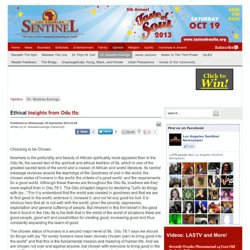
Maulana Karenga (Columnist) Choosing to be Chosen. Odu Ifa; 78:1 Irosu Wori; "Chosen Ones" Odu Ifa: the ethical teachings, by Maulana Karenga. ODU IFA. Odu Ifa texts. Book of Odu Ifa. Ifá. Ifá refers to the system of divination and the verses of the literary corpus known as the Odù Ifá.
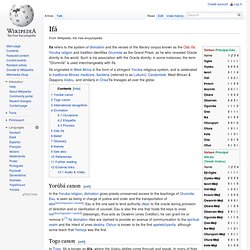
Yoruba religion and tradition identifies Orunmila as the Grand Priest, as he who revealed Oracle divinity to the world. Such is his association with the Oracle divinity; in some instances, the term "Ọ̀rúnmìlà" is used interchangeably with Ifá. Ifá originated in West Africa in the form of a stringent Yoruba religious system, and is celebrated in traditional African medicine, Santería (referred to as Lukumi), Candomblé, West African & Diaspora Vodou, and similarly in Orisa'Ifa lineages all over the globe. Yorùbá canon[edit] Togo canon[edit] In Togo, Ifá is known as Afa, where the Vodou deities come through and speak.
International recognition[edit] Ifa: the religion of the Yoruba peoples. Religions of the world Sponsored link.
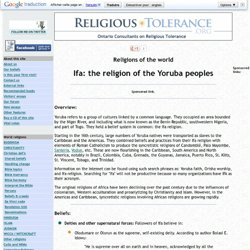
Overview: Yoruba refers to a group of cultures linked by a common language. They occupied an area bounded by the Niger River, and including what is now known as the Benin Republic, southwestern Nigeria, and part of Togo. Institute of the Black World » Ethical Insights From Odu Ifa: Choosing To Be Chosen. Yoruba Religion ‹ Yorupedia. Ike many West African natives, Yoruba practiced the traditional religion, before the introduction of Christianity and Islam.
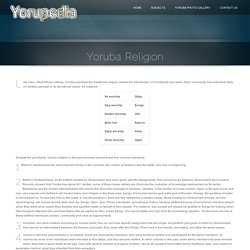
Each community has individual deity (or deities) peculiar to its devotional needs, for instance: Despite the peculiarity, Yoruba religion in the past revolved around these five common elements: Belief in Olodunmare the most important Entity in the universe, the creator of heavens and the earth, who has no beginning. Belief in Deities/Orisas- small entities created by Olodunmare who were given specific assignments; they served as go between Olodunmare and humans. Records showed that Yoruba has about 401 deities; some of these lesser deities are Ọrunmila-the custodian of knowledge-represented by Ifa (while Babalawos are the human intermediaries who reveal the Ọrunmila message to humans).
Yoruba in the time past believed in ancestors- these are dead family members, who were turned to deities and worshipped by the family members. Picture 31: Drumming during Oro festival. Ifa the true religion of Yorubas. Yoruba Creation Myth. Myths of Ife - Index. Sacred-Texts Africa Myths of Ífè By John Wyndham [London, 1921] {Reduced to HTML by Christopher M.
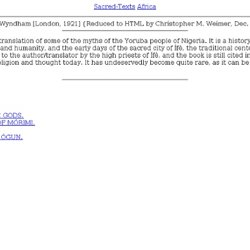
Weimer, Dec. 2002} Art and Ashe in the Yoruba Tradition. Ifa Religion Meetup Groups - Ifa Religion Meetups. The Yoruba Religious Concepts. Differences Between West African & Cuban Based Ifa. Throughout my journey in the West African based spiritual system of Ifa I have encountered much resistance, criticism and attack because my presentation of the system; as learned, did not match the conventional practices of the system.
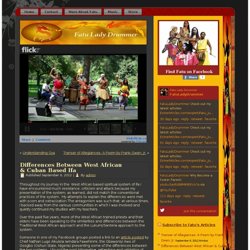
My attempts to explain the differences were met with scorn and ostracization.The antagonism was such that; at various times, I backed away from the various communities in which I was involved and quietly continued my studies with my teachers. Over the past five years, more of the West African trained priests and their elders have been speaking to the similarities and differences between the Traditional West African approach and the Lukumi/Santeria approach to the system. Someone in one of my Facebook groups posted a link to an article posted by Chief Nathan Lugo Aikulola Iwindara Fawehinmi, the Gbawoniyi Awo of Osogbo (Oshun State, Nigeria) presenting some of the differences between the two systems. Here is what was posted regarding the ileke ceremony: 1. Ijo Asaforitifa - Clarifications - Miami Beach, FL. Clarifications About the Orisa Tradition of Yorubaland and the Orisa Tradition of Cuba known as Santeria or the Lucumi: Written by Chief Nathan Lugo Aikulola Iwindara Fawehinmi, the Gbawoniyi Awo of Osogbo *translation courtesy of omo awo Cory Sutherland (Please pardon the typos and grammar issues while I work on editing the english version of this article. - Oloye Aikulola) There are many differences as well as similarities between Cuban Santeria and the Orisa Tradition of Nigeria.
This is an ever-increasing list I am preparing in order to avoid confusion comparing both traditions as well as the traditions of Brazil and Trinidad and Tobago at times. But we must always keep in mind that these are generalizations that I am mentioning to be broad enough and that can apply to the entire Yorubaland for the most part. 1. 2. 3.
. @ maurize what Jim said is. 4. 5. 6. African Traditional Religion. Four Shells, Five Answers - Obi Divination with Coconut or Cowries Shells - Sacramento divination. "Ago Obi, ago Obi, ago Obi"
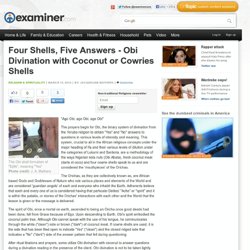
Ajogun yoruba.